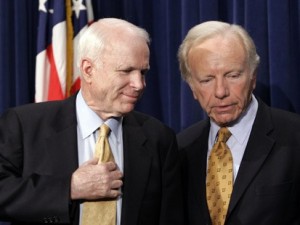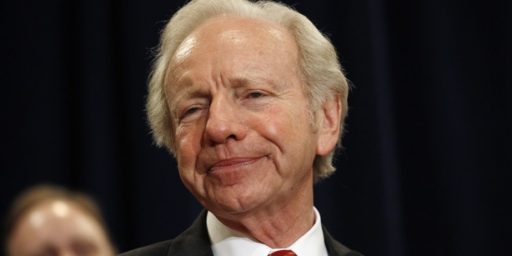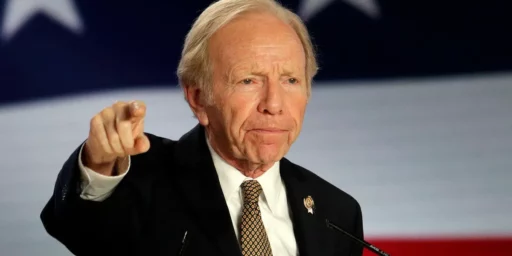Pitching COIN in Afghanistan
 In an op-ed in the Washington Post this morning, Sens. John McCain and Joseph Lieberman make the case for pursuing a counterinsurgency strategy in Afghanistan:
In an op-ed in the Washington Post this morning, Sens. John McCain and Joseph Lieberman make the case for pursuing a counterinsurgency strategy in Afghanistan:
Loose rhetoric about a minimal commitment in Afghanistan is counterproductive for another reason: It exacerbates suspicions, already widespread in South Asia, that the United States will tire of this war and retreat. These doubts about our staying power deter ordinary Afghans from siding with our coalition against the insurgency. Also important is that these suspicions are a major reason some in Pakistan are reluctant to break decisively with insurgent groups, which, in a hedging strategy, they view as integral to positioning Pakistan for influence “the day after” the United States gives up and leaves Afghanistan. That is why it is so important for the president to reject the temptations of minimalism in Afghanistan and instead adopt a fully resourced, comprehensive counterinsurgency strategy, backed by an unambiguous American commitment to success over the long term. In doing so, he must invest the political capital to remind Americans why this fight is necessary for our national security, speak openly and frankly to our nation about the difficult path ahead, and — most of all — explain clearly to our fellow citizens why he is confident that we can prevail.
Not too long ago Pat Lang, who certainly should know, made a similar argument for pursuing a counterinsurgency strategy in Afghanistan even while doubting that the American people would accept such a thing:
I did COIN. I did it in South America. I did it in SE Asia. I did it in Arabia. I did it.
It works. It worked in Iraq. It has been very expensive in Iraq, expensive in money, expensive in political capital, and very expensive in blood if some of that is yours.
Was it necessary to do COIN in Iraq? Yes. It was. The ground was ripe in Iraq for irregular warfare against the US occupation. The “human terrain” was perfect for it. The illusions that accompanied the occupation made the US occupying force a perfect target for irregular warfare. Having made so many mistakes in Iraq, COIN was the only method that would bring the US success in Iraq other than mass murder. The Republican and neocon slogan word “Surge” is just code for COIN. The additional US troops were just part of that COIN effort.
Afghanistan is another place where COIN can work. The ground in Afghanistan is even more fertile for long term irregular warfare against the foreign other than was Iraq. Irregular warfare in Afghanistan is an age-old way of life. In Afghanistan, the people in the next valley are often one’s tribal enemy.
Nevertheless, COIN can work in Afghanistan. The question is not if COIN will work in Afghanistan. The question is whether or not we should pay the exorbitant price that COIN will exact from us for the privilegege of using this methodology in that country.
There are several questions at hand. The first is whether a counterinsurgency strategy can work at all in Afghanistan. Frankly, I’m skeptical given the particular conditions there. Clearly, Col. Lang and Sens. McCain and Lieberman believe it can. That isn’t dispositive but it is testimony that deserves to be taken seriously.
The second is that we need a serious evaluation of the costs of a counterinsurgency strategy in Afghanistan that can be successful. Make no mistake: it will be more expensive, possibly many times more expensive, both in dollars and American lives than such a strategy has been in Iraq and we haven’t reached the end of the road in Iraq yet. Like Col. Lang, I’m skeptical that Americans are willing to shoulder such a burden.
There’s an even more serious question: should we be willing to shoulder such a burden? We are not the British or the Russians. We long for no empires in far-away countries. The insurgents we would be fighting don’t plan on leaving but we do.
The situation in Afghanistan presents us with a terrible dilemma. We can’t just walk away from Afghanistan. On that I’m in complete agreement with Sens. Lieberman and McCain. The downside risk is too great. I doubt that we’re willing to expend the billions of dollars, the thousands of lives, and the years of devotion that a successful counter-insurgency strategy of the sort advocated by Sens. McCain and Lieberman would require but that’s the only way we can leave Afghanistan without taking very serious risks. And the only other approach available that I can envision leaves us with forces stuck in Afghanistan for the foreseeable future, possibly forever.






Were it just Afghanistan by itself, I might be tempted to say let’s give it a decent effort, then if the results aren’t in our favor, get out. But the conflict over there has evolved from chasing a bunch of terrorists out of the country to trying to prevent those same terrorists from taking over a country that well and truly has nukes: Pakistan. The fate of Pakistan and its WMD is now, I think, the real issue underlying our effort in Afghanistan. What we do, and how strongly we do it, in the latter might well determine the fate of former.
One of the several reasons that I opposed the invasion of Afghanistan was that I have never believed that Afghanistan and Pakistan could be considered separately.
But Dave, given 911 and what we came to know about the perpetrators, I don’t think any American president could have done anything different. But another American president might not have weakened our effort in Afghanistan by haring off into the Iraq misadventure. But that’s history and now we are where we are.
I agree that we are where we are. The question is what next?
I don’t what next, but it had better be good. The stakes are now really high. I just had a thought that if Swat were to be duplicated throughout Pakistan, I’d lay odds that within 24 hours, India would launch a preemptive nuclear strike.
We are where we are, but it would be nice if chickenhawk politicians could learn a lesson from this as well. There will never be public support for endless war. One has to think about this before starting an endless war.
As for what to do now, I have more faith in Petraeus and Gates than McCain and Lieberman.